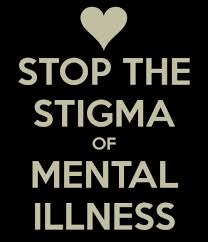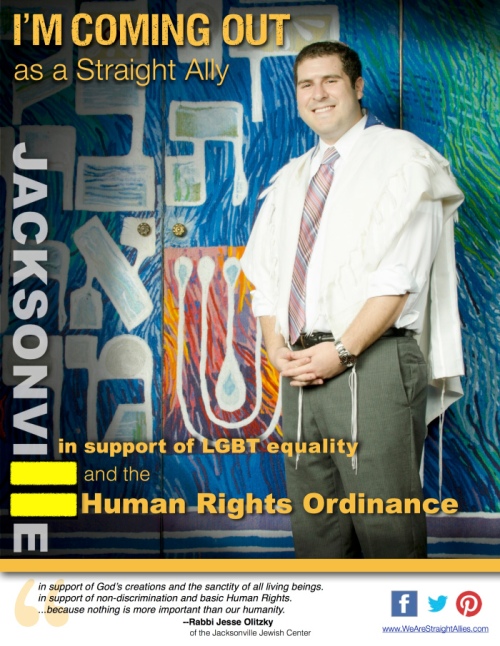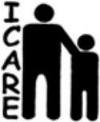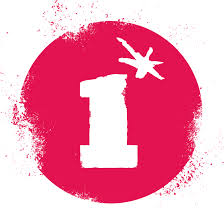 If you live in the Jacksonville area and haven’t yet checked out the One Spark Festival, the world’s largest crowdfunding festival, then I encourage you to check it out. I spent time there on Thursday and Friday and it was a great experience. I went not only to check out the creators and amazing innovators and ideas. I went because of my work with the We are Straight Allies campaign, an ad campaign that brings together clergy, city business leaders, political leaders, community leaders, philanthropists, and “faces” of Jacksonville to encourage the city council to pass the Human Rights’ Ordinance, ensuring that it would no longer be legal for landlords to evict tenants or employers to fire employees because of their sexual orientation or gender identity. The city council disgracefully failed to do so in June 2012! Some suggest that this ad campaign is just stirring the pot, that it is making something out of nothing, just trying to create controversy. Some believe that there is no discrimination in our city and this campaign is just trying to make something out of nothing. Unfortunately, recent events have suggested otherwise.
If you live in the Jacksonville area and haven’t yet checked out the One Spark Festival, the world’s largest crowdfunding festival, then I encourage you to check it out. I spent time there on Thursday and Friday and it was a great experience. I went not only to check out the creators and amazing innovators and ideas. I went because of my work with the We are Straight Allies campaign, an ad campaign that brings together clergy, city business leaders, political leaders, community leaders, philanthropists, and “faces” of Jacksonville to encourage the city council to pass the Human Rights’ Ordinance, ensuring that it would no longer be legal for landlords to evict tenants or employers to fire employees because of their sexual orientation or gender identity. The city council disgracefully failed to do so in June 2012! Some suggest that this ad campaign is just stirring the pot, that it is making something out of nothing, just trying to create controversy. Some believe that there is no discrimination in our city and this campaign is just trying to make something out of nothing. Unfortunately, recent events have suggested otherwise.
There was an article in Friday’s edition of the Florida Times-Union explaining that some were unhappy with the We Are Straight Allies campaign being a part of One Spark, and specifically being housed in the Wells Fargo building, alongside other vendors committed to “Building a Better City.” Housed in the lobby of the Wells Fargo Building, the building’s management company, Parkway Properties, informed the We Are Straight Allies campaign that some of the “key stakeholders” of the building were uncomfortable with the pro-LGBT agenda of the campaign. They were concerned that they – and I – were pushing our agenda on others. While this was in the Wells Fargo building, this was not a complaint from Wells Fargo, for they are an ally and big supporter of LGBT rights and equality. However, other unidentified companies in the building were uncomfortable with the signage and window displays, even wanting to know if the musical performances associated with this creator were going to be “controversial.” The whole point of the campaign – pushing the city council to pass the HRO – is about inclusion, not controversy. The actions of these so-called key stakeholders only reinforced the need to pass the HRO. If this is how companies treat such an organization that focuses on inclusion and human rights, I can’t even imagine how they treat their LGBTQ employees.
I share this not just because it happened only days ago, but also, because this past Shabbat’s Torah reading, Parashat Acharei Mot, is arguably the root cause of such hate, homophobia, and exclusion. In Leviticus chapter 18, we find the beginning of the so-called “holiness code,” a text in which focuses on a lot of “Thou Shalt Not’s.” In that list we find the infamous verse, Lev. 18:22:
V’et zahar lo tishkav mishk’vei isha – to’eivah hi.
Do not lie with a man as one lies with a woman, it is an abomination.
As Conservative Jews, we are part of a movement and a community that does not believe that Torah is set in stone, is min hashamayim, directly from God, without human influence. We also recognize that our own interpretation of Torah evolves through time as society continues to evolve.
When Rabbi Steven Greenberg, the first openly gay Orthodox rabbi in this country, was a scholar-in-residence at the Jacksonville Jewish Center this past winter, he explained how he reinterpreted the verse. This is an interpretation that I have heard before by many of my own teachers, that suggests that if we truly look at the Hebrew, the text isn’t focusing on homosexual relations, but rather forced sexual relations. Thus, according to the Torah a man can force himself unto a woman, but because the text is a patriarchal scripture, you couldn’t do that do another man. So to clarify, according to this understanding, a man can have sexual relations with another man, but it must be consensual. Yet, according to the Torah, a man can rape another woman, can force himself on her. We may not like this interpretation because it is just as problematic, idenitifying the misogyny of scripture.
In all honesty, I am not concerned with how we translate the Hebrew. This is a problematic verse. I am not saying we just get rid of the verse, erase it from Torah, because it is problematic to us. As Conservative Jews, we struggle with text, even when we are uncomfortable with it. But also as Conservative Jews, we cannot accept it as Divine truth because, in 2014, this sole verse has been used to condemn, criticize, delegitimize, and even criminalize same-sex relationships.
We can look at problematic verses in the Torah and see them for what they are – simply a human interpretation from thousands of years ago of the Divine word, be it by Moses or another author. It is then possible for us, in 2014, based on religion’s influence on society and society’s influence on religion, to also interpret the Divine word. And when we interpret the Divine word, at least when I interpret the Divine word, I choose to focus on the holiness of loving my neighbor as myself, of remembering that we are all made in God’s image, and I refuse to believe in a God or accept as Divine word a single verse that delegitimizes a human being.
This past Friday, April 11th, 2014, was the National Day of Silence, an initiative started in 1996 by the Gay, Lesbian, and Straight Education Network (GLSEN), which is now the largest student-run action towards creating safer school environments. Gay-Straight Alliances, common in Middle School and High Schools vowed to take a form of silence to call attention to the silencing effect of anti-LGBTQ bullying and harassment in schools. It is clear that if we do not put an end to such bullying in our schools, then it only continues as adults, no example greater than these key stakeholders trying to bully the We Are Straight Allies campaign out of One Spark, trying to bully human rights and inclusion.
If that bullying is a result of this verse, if the discrimination, bigotry, and hate, is a result of Leviticus 18:22, then we in the Jewish community as a whole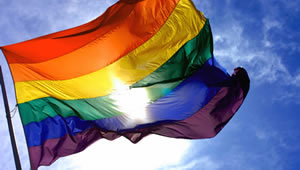 have a moral obligation and imperative to say that this verse does not define us, does not speak for us, and is not how we understand, interpret, or translate God’s Divine word.
have a moral obligation and imperative to say that this verse does not define us, does not speak for us, and is not how we understand, interpret, or translate God’s Divine word.
I prefer to focus on the begin words of the next Torah portion, Parashat Kedoshim, often linked and read as a double portion with Acharei Mot.If we look at these begin words, we truly understand how to act. For it begins with:
Kedoshim Ti’h’yu, ki Kadosh Ani Adonai.
Be Holy, for I, the Lord Your God, Am Holy.
There is nothing holy about bullying, hate, bigotry, homophobia, discrimination, or exclusion. In fact, it is the opposite of holiness: an abomination. Let us then focus on that which is truly holy: each and every one of us, made in God’s image, and let us work to ensure that the holiness and sanctity of each individual is recognized and embraced.
– Rabbi Jesse M. Olitzky


